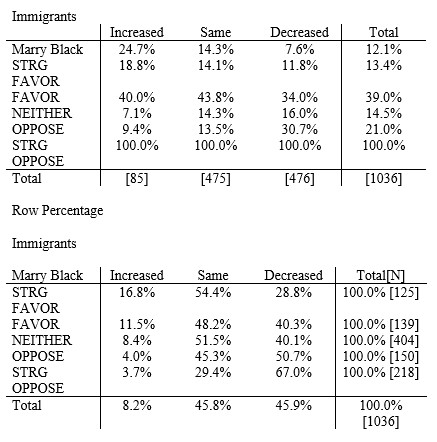Multiple Choice
Refer to the following paragraph to answer the questions below.
Researchers debate the degree to which racism is a major source of white anti-immigrant attitudes in the United States, since most recent immigrants are non-white. To examine this relationship, I used a measure of racial prejudice among whites not wanting a black person to marry a close relative and cross-tabulated it with an opinion question about immigration using data from the 2000 General Social Survey. The variables are percentaged both by row and by column. MARRY BLACK: How would you respond to a close relative marrying a black person? Strongly Favor, Favor, Neither Favor or Oppose, Oppose, Strongly Oppose. IMMIGRANTS: Should the number of people coming from other countries to the U.S. as immigrants be Increased, Stay the Same, or Decrease? Data only for Race = White, GSS 2000. Note: Missing data, Don't Know, No Answer removed from Table. Immigrant response collapsed into three categories. Increase At lot and Increase a Little combined into Increase, Same, Decrease a Little and Decrease a Lot are combined into Decrease.
Column Percentage

-Looking at data from the above two tables, which of the following is FALSE?
A) Over one in four whites favor or strongly favor having a relative marry a black person.
B) Among whites, a positive relationship exists between opposing immigration and not wanting a black person to marry into one's family.
C) About 35 percent of whites oppose or strongly oppose having a black person marry into their family.
D) More than 40 percent of whites favor keeping immigration rates the same, except for those whites who strongly oppose having a black person marry into their family.
E) Among whites who neither support nor oppose a black person marrying a close relative, 40 percent would like to see immigration increased.
Correct Answer:

Verified
Correct Answer:
Verified
Q1: Talk about:<br>-percentile
Q2: Talk about:<br>-frequency distribution
Q4: Talk about:<br>-replication pattern
Q5: Talk about:<br>-cross-tabulation
Q6: Talk about:<br>-partials
Q7: Talk about:<br>-descriptive statistics
Q8: Talk about:<br>-z-score
Q9: Talk about:<br>-normal distribution
Q10: Talk about:<br>-statistical significance
Q11: Someone says, "It is statistically significant at